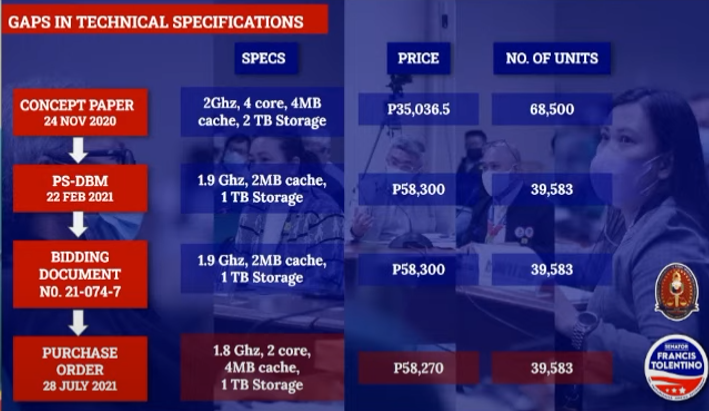Senate probe into pricey laptops: DepEd, DBM go back and forth on MOA for deal

MANILA, Philippines — The Senate Blue Ribbon Committee's third hearing into the laptop fiasco hounding the Department of Education centered on the agreement — or lack thereof — between DepEd and the budget department's procurement service, which took charge of buying laptops that state auditors later found to be pricey.
In the last hearing, senators established that the Procurement Service-Department of Budget and Management does not have a manual of its procedures on selecting suppliers who will be sent requests for quotations. The PS-DBM uses the quotations for its price analysis.
"They only follow a desk procedure, which is part of the PS-DBM’s internal operation manual, which requires the [project management officer in charge] to send at least three suppliers," the Senate’s transcript of stenographic notes presented at the beginning of Thursday's hearing read.
As a result, the PS-DBM nearly began bidding even without the terms of the agreement between them and the education department being signed and set in stone. The Commission on Audit, which originally flagged the transaction, said this should not have been allowed.
Agencies trip on agreement even as invitation to bid proceeds
"The DepEd has offered to engage and PS-DBM has accepted to undertake the procurement activities in relation to the above, subject to the execution of herein agreement," a copy of the MOA presented at the hearing reads.
"For this reason, PS-DBM will act as the procuring agent (procuring entity) in an end-to-end capacity of this project as expressly agreed upon by the parties."
The two departments passed the ball to each other as they referred to internal proposed drafts of the MOA before it was consolidated with their counterpart.
Lawyer Jasonmer Uayan, PS-DBM officer-in-charge, said that a second MOA drafted later in May was never signed nor notarized. At the previous hearing, he said that he tried to convince Lao to revise it when the latter still held his post.
Uayan said that his disagreement with the MOA had nothing to do with the technical specifications of the procurement but with some provisions on the transfer of the funds and the contract implementation stage.
He said he made these concerns known, and both departments were supposed to enter another round of negotiations on the agreement. This all happened despite the notarized MOA from February already being a signed public document.
"In the subsequent discussions, they did not agree to what I wanted to be changed, such that they presented the May 6 memo," he said.
Because of the lack of synergy, senators noticed the gaps in technical specifications as the transaction moved through the procurement process.

DepEd 'suki' limiting competition?
Sen. Jinggoy Estrada questioned the choice of the department's suppliers, pointing out that the intention behind public bidding is to open up government contracts to more suppliers and to level the playing field.
"We should be more welcoming of new players since that would make for better competition. But don’t you think we are discouraging these new players from participating in government biddings if they are being singled out for investigation?" he said, going as far as accusing the department of circumventing the law against splitting contracts.
Under Section 51 of Republic Act No. 9184 or the Government Procurement Reform Act, repeat orders as a method or procurement is allowed, provided that these "will not result in splitting of contracts, requisitions, or purchase orders."
Addressing DepEd Director Abram Abanil, he said that past department contracts consistently had the same names — with some supplying its IT needs since 2013 with accumulated contracts amounting to billions.
Among the names Estrada pointed out were:
- Advance Solutions, Inc.
- Columbia Technologies, Inc.
- Reddot Imaging Philippines, Inc.
- Techguru Inc.
- Girltekki Inc.
The senator noted that Columbia Technologies in particular has been a DepEd supplier since 2013 but has never undergone scrutiny by the Commission on Audit or any other government agency
"The effect of a repeat order is that it dispenses with the need of undergoing public bidding again. In the case of these suppliers, why did we not just bid for the goods in a single lot? Was there lack of planning here or was the DepEd deliberately dividing the contract so that it can use repeat orders as an alternative mode of procurement?"
Abanil responded by saying the winners have always been the companies that submitted the lowest bids: "We have always gone through competitive bidding with regards to the process of awarding contracts to these suppliers."
"If I recall correctly, we decided on breaking it into further lots instead of making it into one lot because we were worried that some suppliers would not comply with the [Net Financial Contracting Capacity], if it was just one lot," he said in mixed Filipino and English.
Net Financial Contracting Capacity looks into whether a firm can still afford to enter into new contracts. It takes into account a potential supplier's assets and liabilities and the value of outstanding goods and services in ongoing contracts as well as in contracts that have yet to start.
He added that the department had already been the subject of several Audit Observation Memorandums before the COA in the past, though these were primarily on the timeliness in the submission of documents in transactions.
- Latest
- Trending




























